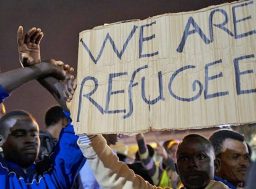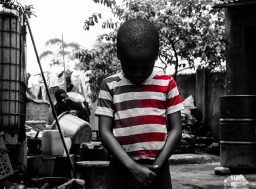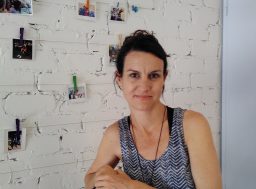
This year, Desert Rose e.V. and some friendly Israeli NGO spent the 20th June in the detention camp Holot. On the occasion of the World Refugee Day, they wanted to show solidarity towards the prisoners there. Holot,, which is some 80 kilometres to the southeast of Be’er Sheva, is a hopeless place. The landscape is dominated by desert, sand, and barbed wire. Long rows of flat barracks stretch in the middle of Negev desert. The complex, which is twice fenced and protected with barbed wire, has been running since December 2013. Originally, it should have been an extension to Saharonim prison which is situated next door. But it turned out differently, as the „Anti Infiltration Law“ was declared invalid by the supreme court in Israel in September 2013, which lies down that „intruders“ – this is what refugees who illegally cross the border of Israel are called– can be imprisoned for three years in the desert.
The Isreali government was not pleased about this verdict and this is why a new law was passed by the knesset (the Israeli parliament) very quickly on December, 14, 2013. This law shortens the imprisonment to one year, yet an arrest in the open prison Holot is planned after that. There, the refugees have to spend the nights and have to appear to roll call three times a day. The new law also includes that refugees can be picked up in all of Israel and taken to Holot by force. After the change of this law, there were random arrests in the streets of Tel Aviv. The ministry of the interior suddenly denied to extend visas and instead issued a draft card for imprisonment in Holot.
But let us go back to our stay in June. It is ten o’ clock in the morning and it is going to be a beautiful sunny day in Tel Aviv. We meet at the bus stop in the Levinskiy park. Three busses are already waiting. Other busses will start in Jerusalem and in other parts in Israel to go to Holot. The activist Sigal Rozen organises these trips every Saturday. Sigal does not belong to an NGO. When you ask her why she does all this, she says “Why not?“, smiles and continues “What is happening in Holot is wrong and I am shocked about it. If the Israeli government is treating these people like the scum of the earth, this is the least I can do for them!” She is wonderful!
Those who do not take the busses to Holot, carpool with like-minded people to start the World Refugee Day together with the inmates there. Many of the black Africans who live in Israel fear that they will be taken to Holot soon. Our bus is full of food and water. Musicians are there as well and sing Sudanese, Eritrean, and Isreali songs. Their singing makes the journey more bearable. A 17-year Sudanese sits behind me. His hands look like he is 60 years old and has worked on fields all his life. He does not speak English and only a little Hebrew and Arabic. My Sudanese interpreter helps me talk with the young man. His name is Kenaan and he apologises that he smells of sweat and dust. He tells us that he had been working on a construction side all night and had no time to wash himself in the sea. But he really wanted to catch one of these busses. We ask him why he wants to go there and he replies that his cousin has to stay in Holot. I notice that he feels uncomfortable because he is dirty. I cannot help grinning and Kenaan is starting to laugh out loud and after all the others around us start to laugh, too. Someone offers water and Coke. Then, finally, we have a break. Some people use the toilet, others have a cup of coffee. It’s the simple things in life that connect people with each other, even in those hard hours. After 30 minutes, the journey continues. The closer we get to Holot the more nervous we become. The Sudanese activist Osman says that our visit is particularly important to the inmates. It makes them feel like they are not alone and that they are not forgotten. Osman asks us to talk to every single person, not only to family and friends. Sigal reminds us to not provoke the military and the police and that we should not be provoked by them. Finally we reach Holot and it really does look like everyone has described it to us: bleak.
Author: Rahel Woldemichael
Translation: Nicole Freibott/ Diana Köth/ Melanie Martin
Addition: On 22 September 2014 Israel’s Supreme Court in Tel Aviv imposed to close the controversial “open prison” Holot within 90 days because the long imprisonment infringes the migrants’ rights. Among other things, it was stated in the verdict that “immigrants do not lose their right of absolute dignity just because they enter the country by all available means”. After numerous petitions and demonstrations against the inhumane treatment of African migrants in Holot, critics and inmates are relieved by this verdict. At the same time, many people fear that Israel’s ministry of the interior will create a new mechanism to be able to imprison migrants. It remains to be seen what the value of this recent verdict actually is.







Follow us